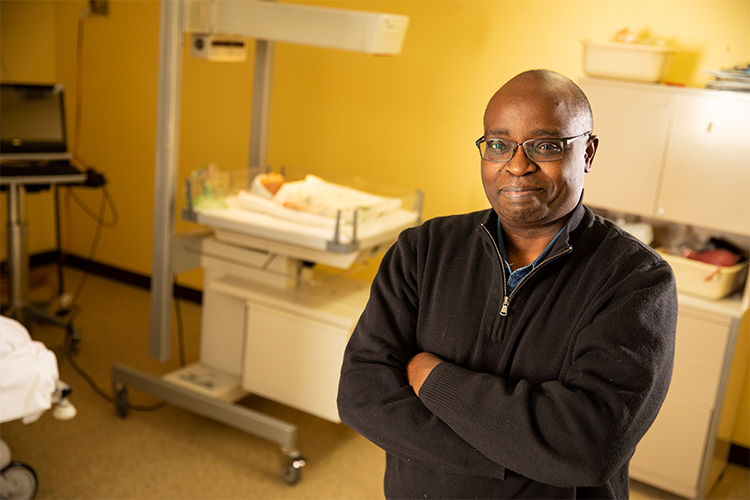
Fatherly love
The important role fathers can play in reducing infant mortality rates and improving maternal and child health
African-American babies in Milwaukee are three times more likely to die before their first birthday than white babies. It’s a fact that’s remained stubbornly resistant to change despite widespread community efforts.
The average infant mortality rate for black babies in Milwaukee from 2015-17 was 15.4, meaning that for every 1,000 live births, an average of 15.4 died before their first birthday. For white babies, the average rate for the same period was 5.1. Those numbers, provided by the City of Milwaukee Health Department, represent a slight worsening of the situation from the previous three-year rolling average. From 2014-16, the average African-American infant mortality rate was 13.7, and it stood at 5.0 for whites.
“All of the resources and all of the energy that have been invested in infant mortality, we should see those rates changing,” says City of Milwaukee Health Commissioner Jeanette Kowalik, a UWM alum.
Emmanuel Ngui, an associate professor in community and behavioral health promotion in the Joseph J. Zilber School of Public Health, is working to improve those numbers. He has focused his research on health inequalities and the role that social determinants of health, such as income and literacy, play in birth outcomes and child health and well-being.
Ngui says those social determinants – poverty, lack of jobs, discrimination/segregation, lack of access to health care – are underlying factors making it hard to move the needle on infant mortality rates. Within that context, though, he’s focused much of his work on one particular piece of the effort – looking at the impact of African-American fathers on maternal and child health.

Ngui’s recent work has involved three major studies. They include a pilot project on the involvement of African-American fathers in prenatal care as well as focus groups with African-American men exploring how to improve their pre- and postnatal family engagement. Also, Ngui was the principal investigator on the city’s most recent comprehensive Fetal Infant Mortality Review, published in 2017, which examined the causes of premature deaths and made recommendations on ways to reduce them.
Kowalik praises Ngui for building a bridge between his university research and his community involvement. “Oftentimes, you’ll see someone that is really, really good at community engagement, but they’re not a practitioner or researcher,” she says. “To find someone like Dr. Ngui that has both is very rare.”
As a father himself, Ngui is acutely aware of men’s evolving roles as parents. “Looking back at my life and my own parents,” he says, “the mother had the traditional role of taking care of the kids, and the father was very much the economic provider. But getting home and seeing how tired my wife was, I knew I was a father, and I had to play a supportive role rather than assume the traditional roles held by my parents.”
So personally, he worked to become a more engaged father. Professionally, he has worked on a pilot project seeking to get fathers more involved in prenatal care by partnering with the Wheaton Franciscan-St. Joseph Women’s Outpatient Center and The Parenting Network’s CenteringPregnancy. The “Expecting Mom, Expecting Dads” project works with African-American couples to enhance the role of fathers during prenatal care and throughout pregnancy while also examining barriers to paternal engagement.
“I wanted to pilot a small study to try to address some of the issues that I expected fathers would face,” Ngui says. Among the issues: whether fathers were willing to take time to participate in prenatal care, and if so, whether they’d be able to get time off work for it.
Fathers involved in the project attended prenatal classes and doctor’s appointments with the mothers and received a list of educational resources on pregnancy. “They welcomed the opportunity to talk with and learn from other fathers,” Ngui says. “They liked being part of the pregnancy and delivery process.”
Although the pilot project eventually involved only four couples, Ngui says the birth outcomes were positive, with all babies born full-term weighing between 7 and 9 pounds. Premature babies are defined as those born before 37 weeks, and the World Health Organization defines low birth weight as 5.5 pounds or lower.
Increasing healthy African-American birth results, like those achieved in his pilot project, is Ngui’s ultimate goal. And yet, as the principal investigator for Milwaukee’s Fetal and Infant Mortality Review, Ngui knows the complex factors that contribute to the city’s infant mortality rate.
The review, a collaborative project with the Milwaukee Health Department, compiled and examined information on stillbirths and infant deaths from 2012-15, then made recommendations to address the causes.
“Statistics are people with the tears washed away,” Ngui and the health department’s Karen Michalski wrote in the report’s introduction, paraphrasing the proverbial saying. “It is easy to talk about ‘mortality’ or ‘rates,’ and lose sight that behind each statistic, each number, is a life and a family’s story.”
Results showed that major factors in African-American infant mortality rates were premature births and unsafe sleeping conditions. “The underlying reason for the increased rates of preterm births remain unclear,” the report states. “However, research suggests that a combination of economic, social and environmental factors, including higher levels of chronic, toxic stress play a role.”
Ngui says his work with fathers is an attempt to address that stress, and previous research has shown that fathers’ involvement can often help ease mothers’ stress.
He’s conducted focus groups with almost 50 African-American fathers and fathers-to-be about the challenges they face in engaging with their children. Many said they never had the opportunity to participate in prenatal care because, even when they accompanied mothers to clinics and doctor’s offices, they were excluded from the conversations.
Ngui believes interested fathers must be included from the beginning. That allows them to become a resource for their partner during pregnancy and help care for their children, especially in the case of a premature birth.
“For some men, especially with a preterm baby, they just don’t even know how to hold it,” Ngui says. “Some of them are big guys, but they have this very tiny baby who fits in the palm of their hand. They don’t know how to parent such a small, premature baby, and also what to do to support a partner with such a small baby.”
The focus groups also highlighted the challenges that many African-American fathers can face, such as a lack of jobs that pay enough to support their families or provide good housing. Other challenges include negative stereotypes about absentee or deadbeat fathers as well as high incarceration rates that can make it difficult to just stay in touch with their children.
“What struck me a little bit were the fathers who said they’d been incarcerated, and the only thing that kept them going was the picture of their children,” Ngui says. “They perceived that as engagement. At first, I thought, ‘That’s not really engagement,’ but that constant thinking of children is what fathers do. It’s just a tiny connection, but it’s engagement at a different level.”
Ngui says that funders of maternal and child programs are paying more attention to the role of fathers. It offers hope for expanding his work on prenatal care and fatherhood to include more locations and more fathers.
“My desire is to see whether we can scale it up,” Ngui says. “There’s growing interest in engaging fathers but very limited research out there showing the contribution of fathers to good outcomes.”
